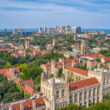A smoker in Leipzig, Germany. (Photo from 2018.) / Credit: Tobias Tullius / Unsplash (CC0))
CNA Newsroom, Apr 2, 2024 / 11:15 am (CNA).
While Germany legalized the recreational use of cannabis on Monday, April 1, the debate over the contentious legislation is far from over. Catholic voices have raised several concerns about legalizing drug use — even if one German bishop has supported decriminalization.
The German law, which came into effect April 1, allows individuals over 18 to hold up to 25 grams for personal use or grow three cannabis plants. The drug can also be smoked in public places under certain conditions, even though some restrictions on the ability to purchase and use cannabis are upheld.
Proponents argue the move aims to bolster health protections and dismantle the illegal cannabis market, reported CNA Deutsch, CNA’s German-language news partner.
The Catholic Church has maintained a clear and constant position on recreational drug use. The Catechism of the Catholic Church states: “The use of drugs inflicts very grave damage on human health and life. Their use, except on strictly therapeutic grounds, is a grave offense. Civil authorities should enforce the laws against them” (No. 2291).
The Catechism also affirms the Christian virtue of temperance, which “disposes us to avoid every kind of excess: the abuse of food, alcohol, tobacco, or medicine,” (No. 2290).
It is the medicinal aspect of cannabis use that previously prompted a German bishop, Franz-Josef Bode, to tell journalists in 2022 that he used cannabis — prescribed by his doctor — to alleviate back pain and that he personally supported some form of decriminalization. (Bode, a key player in the German Synodal Way, resigned from office as bishop of Osnabrück in March 2023.)
The Commissariat of the German Bishops in Berlin — an official liaison office working to integrate Catholic perspectives into Germany’s political discourse — issued a more substantial statement on the matter in 2023.
Raising several concerns, the commissariat called for better protection of human dignity, especially the youth and families. The statement also warned of the potential effects of cannabis on anyone under 25 years of age, pointing to evidence from several scientific studies. At the same time, the bishops’ office emphasized the need for evaluations after any laws come into power.
The American experience
Based on over a decade of experience with the actual impact of legalization in parts of the United States, Archbishop Samuel Aquila of Denver issued a pastoral letter on drugs in November 2023 — some 10 years after Colorado legalized cannabis.
Titled “That They Might Have Life,” the letter presents the Church’s teaching on recreational drugs with a particular focus on marijuana, aiming to “help Catholics intelligently dialogue with the 70% of Americans who currently believe marijuana should be legal.”
“The most important thing we can do as Christians in response to a drug culture is to proclaim the Gospel. It is through the love, mercy, meaning, and hope found in Christ that people will be deterred from drug use or inspired to break free of its influence,” the archbishop wrote.
Regarding the belief that cannabis is not harmful, the archbishop in November commented that Colorado “witnessed a spike in addiction, with marijuana use disorder more than doubling in a span of less than 20 years. This is not surprising since Coloradans’ cannabis use has increased dramatically since legalization.”
Aquila warned: “More people using marijuana inevitably means more addiction.”















